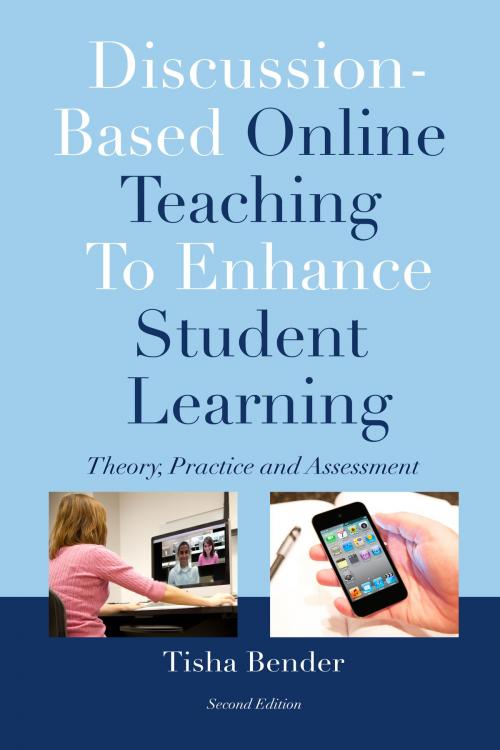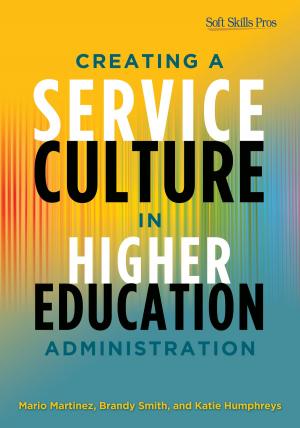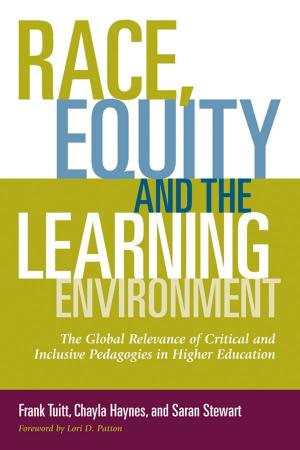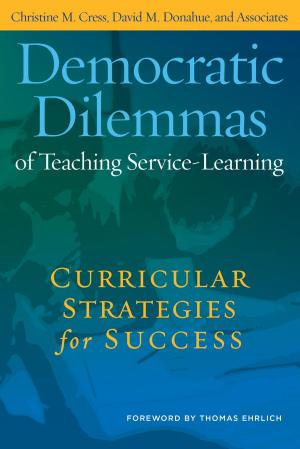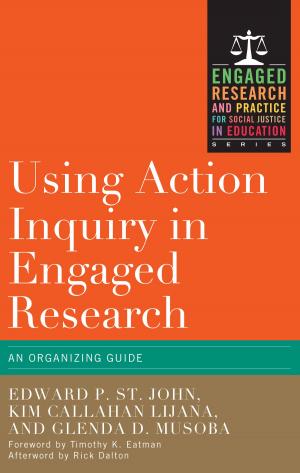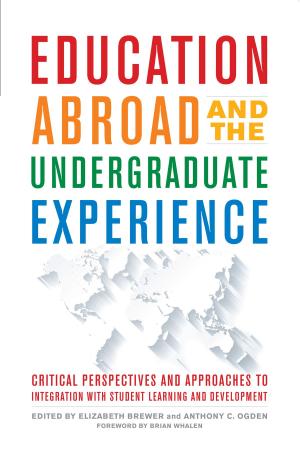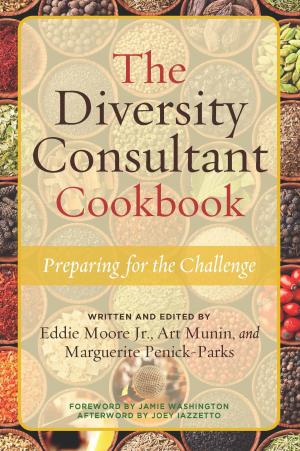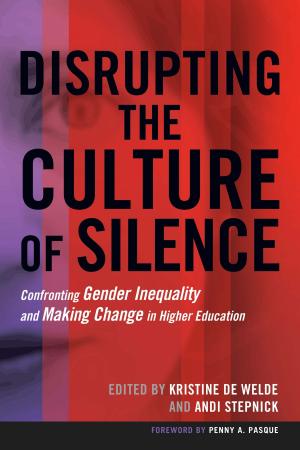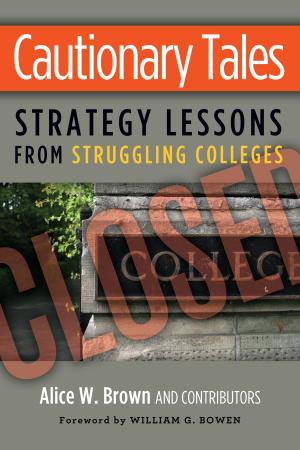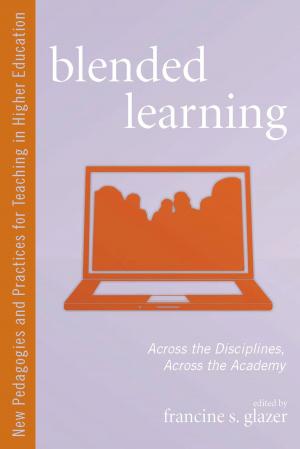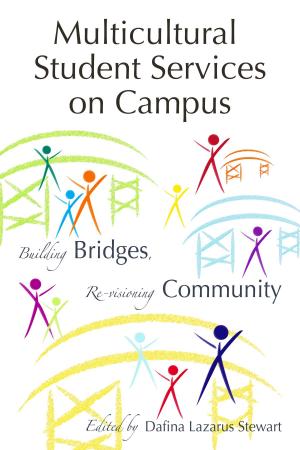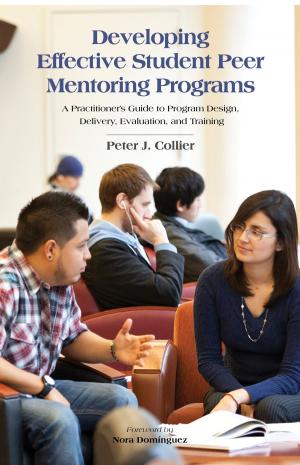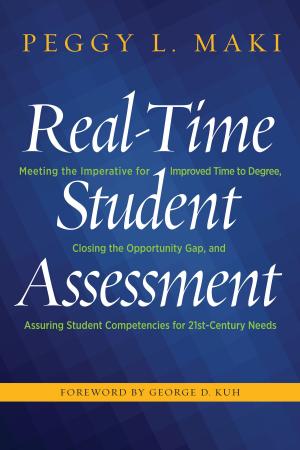Discussion-Based Online Teaching To Enhance Student Learning
Theory, Practice and Assessment
Nonfiction, Reference & Language, Education & Teaching, Higher Education| Author: | Tisha Bender | ISBN: | 9781579227005 |
| Publisher: | Stylus Publishing | Publication: | July 27, 2012 |
| Imprint: | Stylus Publishing | Language: | English |
| Author: | Tisha Bender |
| ISBN: | 9781579227005 |
| Publisher: | Stylus Publishing |
| Publication: | July 27, 2012 |
| Imprint: | Stylus Publishing |
| Language: | English |
"The new edition of Tisha Bender’s book exceeds even the virtues of the first. She has made her work more timely than ever, with attention to current debates about cognition, reading, networked communications, and other features of life in the digital age. She also knows how today’s online students think and behave, and what can be done to make them effective learners. But unlike others writing about online teaching and learning, Bender takes nothing for granted about the transformational features of the digital age for education. She believes in what’s new, but makes the case for online pedagogical innovation reflecting thoughtful judgments about what the digital age means for students and instructors alike. This book offers a practical discourse of online course design framed by recognition of how the best teaching is also theoretical and critical. Much more than a simple 'how-to', this book offers a deep reading of a significant dimension of online teaching. Readers will learn how to be better online teachers and also better thinkers about what they do in the virtual classroom.”?Steven Weiland, College of Education, Michigan State University
“I’ve been teaching at Rutgers University since 1968 and Tisha Bender’s wonderful little book served as the primer for designing my first online course two years ago. Now we have the second edition, even wiser and more useful than the first in a rapidly advancing field where even old dogs can learn new tricks. A must read for the novice deciding whether to go online, or forced to do so by circumstances, and a necessary reference guide throughout the semester when the unexpected starts happening. Bender’s been there and she tells all.”?Dr. Rudolph M. Bell, Professor of History, Rutgers, The State University of New Jersey
The new edition of what is now considered a classic on online learning has been expanded by about a third to reflect new opportunities offered by social media, new insights and ideas derived from the author’s teaching in the eight years since she wrote the first edition, as well as from extensive research in the latest literature.
In particular, Tisha Bender investigates whether the existing paradigm of teaching and learning has been changed, not so much because of the advent of the Internet, but because of the potential divide between the expectations and practices of students who are “digital natives” of the digital revolution, and those of their teachers who are mostly “digital immigrants”. She addresses the question: do we need to change the way we teach in order to reach and engage digital natives fruitfully and enjoyably in their education.
“I’ve been teaching at Rutgers University since 1968 and Tisha Bender’s wonderful little book served as the primer for designing my first online course two years ago. Now we have the second edition, even wiser and more useful than the first in a rapidly advancing field where even old dogs can learn new tricks. A must read for the novice deciding whether to go online, or forced to do so by circumstances, and a necessary reference guide throughout the semester when the unexpected starts happening. Bender’s been there and she tells all.”?Dr. Rudolph M. Bell, Professor of History, Rutgers, The State University of New Jersey
The new edition of what is now considered a classic on online learning has been expanded by about a third to reflect new opportunities offered by social media, new insights and ideas derived from the author’s teaching in the eight years since she wrote the first edition, as well as from extensive research in the latest literature.
In particular, Tisha Bender investigates whether the existing paradigm of teaching and learning has been changed, not so much because of the advent of the Internet, but because of the potential divide between the expectations and practices of students who are “digital natives” of the digital revolution, and those of their teachers who are mostly “digital immigrants”. She addresses the question: do we need to change the way we teach in order to reach and engage digital natives fruitfully and enjoyably in their education.
"The new edition of Tisha Bender’s book exceeds even the virtues of the first. She has made her work more timely than ever, with attention to current debates about cognition, reading, networked communications, and other features of life in the digital age. She also knows how today’s online students think and behave, and what can be done to make them effective learners. But unlike others writing about online teaching and learning, Bender takes nothing for granted about the transformational features of the digital age for education. She believes in what’s new, but makes the case for online pedagogical innovation reflecting thoughtful judgments about what the digital age means for students and instructors alike. This book offers a practical discourse of online course design framed by recognition of how the best teaching is also theoretical and critical. Much more than a simple 'how-to', this book offers a deep reading of a significant dimension of online teaching. Readers will learn how to be better online teachers and also better thinkers about what they do in the virtual classroom.”?Steven Weiland, College of Education, Michigan State University
“I’ve been teaching at Rutgers University since 1968 and Tisha Bender’s wonderful little book served as the primer for designing my first online course two years ago. Now we have the second edition, even wiser and more useful than the first in a rapidly advancing field where even old dogs can learn new tricks. A must read for the novice deciding whether to go online, or forced to do so by circumstances, and a necessary reference guide throughout the semester when the unexpected starts happening. Bender’s been there and she tells all.”?Dr. Rudolph M. Bell, Professor of History, Rutgers, The State University of New Jersey
The new edition of what is now considered a classic on online learning has been expanded by about a third to reflect new opportunities offered by social media, new insights and ideas derived from the author’s teaching in the eight years since she wrote the first edition, as well as from extensive research in the latest literature.
In particular, Tisha Bender investigates whether the existing paradigm of teaching and learning has been changed, not so much because of the advent of the Internet, but because of the potential divide between the expectations and practices of students who are “digital natives” of the digital revolution, and those of their teachers who are mostly “digital immigrants”. She addresses the question: do we need to change the way we teach in order to reach and engage digital natives fruitfully and enjoyably in their education.
“I’ve been teaching at Rutgers University since 1968 and Tisha Bender’s wonderful little book served as the primer for designing my first online course two years ago. Now we have the second edition, even wiser and more useful than the first in a rapidly advancing field where even old dogs can learn new tricks. A must read for the novice deciding whether to go online, or forced to do so by circumstances, and a necessary reference guide throughout the semester when the unexpected starts happening. Bender’s been there and she tells all.”?Dr. Rudolph M. Bell, Professor of History, Rutgers, The State University of New Jersey
The new edition of what is now considered a classic on online learning has been expanded by about a third to reflect new opportunities offered by social media, new insights and ideas derived from the author’s teaching in the eight years since she wrote the first edition, as well as from extensive research in the latest literature.
In particular, Tisha Bender investigates whether the existing paradigm of teaching and learning has been changed, not so much because of the advent of the Internet, but because of the potential divide between the expectations and practices of students who are “digital natives” of the digital revolution, and those of their teachers who are mostly “digital immigrants”. She addresses the question: do we need to change the way we teach in order to reach and engage digital natives fruitfully and enjoyably in their education.
